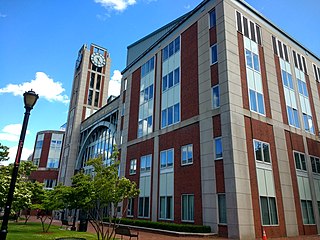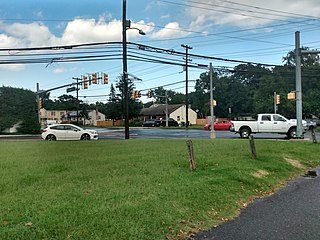Related Research Articles

Rutgers University, officially Rutgers, The State University of New Jersey, is a public land-grant research university consisting of four campuses in New Jersey. Chartered in 1766, Rutgers was originally called Queen's College, and was affiliated with the Dutch Reformed Church. It is the eighth-oldest college in the United States, the second-oldest in New Jersey after Princeton University, and one of nine U.S. colonial colleges that were chartered before the American Revolution.

Richard Levis McCormick is a historian, professor and president emeritus of Rutgers University.

Robert Clarkson Clothier was the fourteenth president of Rutgers University, serving from 1932 to 1951.

Rutgers University–Newark is one of three regional campuses of Rutgers University, a public land-grant research university consisting of four campuses in New Jersey. It is located in Newark. Rutgers, founded in 1766 in New Brunswick, is the eighth oldest college in the United States and a member of the Association of American Universities. In 1945, the state legislature voted to make Rutgers University, then a private liberal arts college, into the state university and the following year merged the school with the former University of Newark (1936–1946), which became the Rutgers–Newark campus. Rutgers also incorporated the College of South Jersey and South Jersey Law School, in Camden, as a constituent campus of the university and renamed it Rutgers–Camden in 1950.

Rutgers University–Camden is one of three regional campuses of Rutgers University, a public land-grant research university consisting of four campuses in New Jersey. It is located in Camden, New Jersey. Founded in 1929 as the South Jersey Law School, Rutgers–Camden began as an amalgam of the South Jersey Law School and the College of South Jersey. It is the southernmost of the three regional campuses of Rutgers—the others being located in New Brunswick and Newark. It is classified among "R2: Doctoral Universities – High research activity".
Douglass Residential College is a non-degree-granting program open to female undergraduate students at any of the degree-granting schools of Rutgers University-New Brunswick. It succeeded the liberal arts degree-granting Douglass College after it was merged with the other undergraduate colleges at Rutgers-New Brunswick in 2007. Originally named the New Jersey College for Women when founded in 1918 as a degree granting college, it was renamed Douglass College in 1955 in honor of its first dean. The program now called Douglass Residential College is no longer a degree granting unit of Rutgers, but is a supplementary program that female undergraduate students attending the Rutgers-New Brunswick undergraduate schools may choose to join. Female students enrolled at any of the academic undergraduate schools at Rutgers–New Brunswick, including, e.g., the School of Arts and Sciences, School of Engineering, School of Environmental and Biological Sciences, School of Pharmacy, Mason Gross School of the Arts, may now also enroll in Douglass Residential College, which offers special enrichment and career preparation experiences, special projects, and educational and service travel, and at which they must satisfy additional requirements specific to the college. Douglass seeks to provide the benefits of a close-knit small community of women students and offers programs specially designed to help women students to identify their unique abilities and develop confidence. These programs include, for example, a strong emphasis on opportunities to participate in service/learning trips in foreign countries, support for and expansion of racial and cultural diversity, and a wide range of training and enrichment activities offered by a career and leadership development center known as the "BOLD" Center.
Richard Patrick McCormick was a historian, former university professor of history, administrator, professor emeritus at Rutgers University in New Brunswick, New Jersey, and president of the New Jersey Historical Society. McCormick was internationally recognized for his expertise in New Jersey and early American political history.
Rutgers University is an institution of higher learning with campuses across the State of New Jersey its main flagship campus in New Brunswick and Piscataway, and two other campuses in the cities of Newark and Camden, New Jersey.

The Rutgers Scarlet Knights are the athletic teams that represent Rutgers University's New Brunswick campus. In sports, Rutgers is famously known for being the "Birthplace of College Football", hosting the first ever intercollegiate football game on November 6, 1869, in which Rutgers defeated a team from the College of New Jersey with a score of 6 runs to 4.
The School of Arts and Sciences is an undergraduate constituent school at the New Brunswick-Piscataway area campus of Rutgers University. Established in 2007 from the merger of Rutgers' undergraduate liberal arts colleges and the non-student college known as the "Faculty of Arts and Sciences," the School of Arts and Sciences was implemented to centralize and consolidate undergraduate education at the university, focusing on providing one set of admissions and graduation requirements and imposing a universal core curriculum.

From 1969 to 2007 Livingston College was one of the residential colleges that comprised Rutgers, The State University of New Jersey's undergraduate liberal arts programs. It was located on Livingston Campus in Piscataway, New Jersey. In the Fall of 2007 the New Brunswick-area liberal arts undergraduate colleges, including Livingston College, merged into one School of Arts and Sciences of Rutgers University.

Rutgers Law School is the law school of Rutgers University, with classrooms in Newark and Camden, New Jersey. It is the largest public law school and the 10th largest law school, overall, in the United States. Each class in the three-year J.D. program enrolls approximately 350 law students. Although Rutgers University dates from 1766, its law school was founded in Newark in 1908. Today, Rutgers offers the J.D. and a foreign-lawyer J.D., as well as joint-degree programs that combine a J.D. with a graduate degree from another Rutgers graduate program. Rutgers has law alumni who practice in every U.S. state and in foreign jurisdictions throughout the world. Current well-known alumni include U.S. Senators Elizabeth Warren (MA) and Robert Menendez (NJ) and three of seven sitting justices on the New Jersey Supreme Court. The late United States Supreme Court Justice Ruth Bader Ginsburg was a member of the Rutgers law faculty early in her career. Rutgers serves a unique role in New Jersey's legal landscape: the current Constitution of New Jersey was adopted in 1947 pursuant to a convention at Rutgers University, and the Rutgers Law Library serves as a repository of New Jersey's key legal documents from the colonial era through current legislation and case law.

Bridgeboro is an unincorporated community located within Delran Township in Burlington County, New Jersey, United States. It is situated on the Rancocas Creek. Bridgeboro is located near U.S. Route 130, which crosses the Rancocas, connecting Delran with Delanco Township.

The Rutgers University Police Department (RUPD) is a campus police agency responsible for law enforcement on the New Brunswick, Newark, and Camden campuses of Rutgers University. RUPD is a department of the university's Division of Administration and Public Safety, overseen by Rutgers Institutional Planning and Operations (IP&O) which also houses Rutgers University Emergency Services (RUES) which is responsible for Emergency Medical Services and emergency management on the campus as well as responding to fire and hazardous materials emergencies in coordination with local first responders. The Division of Administration and Public Safety also oversees the campus bus system, the Rutgers Golf Course, and other services on campus.
Rutgers Business School – Newark and New Brunswick is the graduate and undergraduate business school located on the Newark and New Brunswick campuses of Rutgers University. It was founded in 1929. It operated under several different names before consolidating into Rutgers Business School.

Charles Alling Gifford was an American architect and a partner in the New York City firm of Gifford & Bates. He is best remembered for his resort hotels, but also designed houses, churches, and five armories for the New Jersey National Guard.
Ernest F. Schuck was an American Democratic Party politician who served for seven years as mayor of Barrington, New Jersey and eight years in the New Jersey General Assembly, from 1974 to 1982, where he represented the 5th Legislative District.
Robert Louis Geddes was an American architect, planner, writer, educator, past principal of the firm Geddes Brecher Qualls Cunningham (GBQC), and dean emeritus of the Princeton University School of Architecture (1965-1982). As principal of GBQC, select major projects include Pender Labs at the Moore School of Electrical Engineering, University of Pennsylvania, the Philadelphia Police Headquarters, the Liberty State Park master plan, the Philadelphia Center City master plan, and his best-known work, the Dining Commons, Birch Garden, and Academic Building at the Institute for Advanced Study. He was a Fellow of the American Institute of Architects; recipient of honorary doctorates from Princeton University, City College of New York, and the New Jersey School of Architecture/NJIT; recipient of the Topaz Award from the American Institute of Architects and the Association of Collegiate Schools of Architecture, and, along with his firm, was the recipient of the Architecture Firm Award.
References
- ↑ Staff. "Manual of the Legislature of New Jersey: 1979 edition", p. 221. Fitzgerald's, 1979. Accessed September 30, 2016. "Assemblyman Schuck was born in Bridgeboro, March 1, 1929. He was graduated at Palmyra High School and attended Rutgers University College."